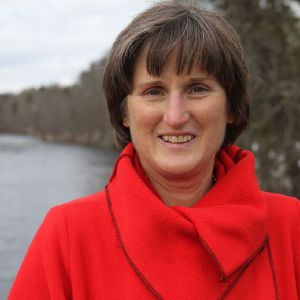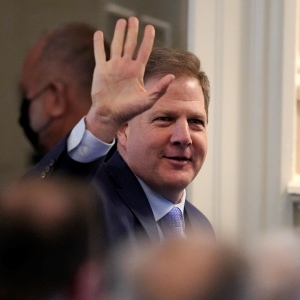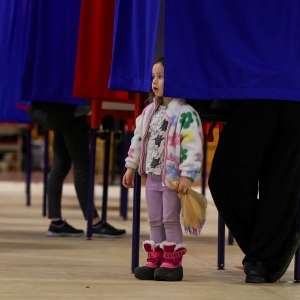Why does New Hampshire favor Democratic candidates nationally but Republicans in the state?

Kylie Copp peeks out from the voting booth where her father Corey Copp votes in Canaan on Tuesday. Jennifer Hauck/Valley News staff
| Published: 11-07-2024 4:57 PM |
Pembroke residents voted decisively in favor of Maggie Goodlander on Tuesday, where about 300 more people chose the Democrat to represent them in Congress over her Republican opponent, Lily Tang Williams. Vice President Kamala Harris almost pulled off a win there, too – just 45 fewer ballots were cast for her than former President Donald Trump in the town.
Down the ballot, however, Pembroke trended conservative. Governor-elect Kelly Ayotte won the town by almost 600 votes, and residents picked all Republicans to represent them in the state Senate and House of Representatives.
It’s indicative of a larger trend. As New Hampshire voters repeatedly favor Republicans for state office, they continue to send Democrats to the White House and Congress. How does that happen?
Political scholars say it’s likely due to split-ticket voting. That’s when someone doesn’t vote straight down the party line – for example, some voters chose candidates from both parties, like voting for both Harris and Ayotte.
Christopher Galdieri, a professor of American government at Saint Anselm College, said split tickets are uniquely common in New Hampshire and that voters seem to differentiate between federal and state races.
“It’s really different from what we’ve seen in a lot of the country, where ticket-splitting like this has almost entirely died off,” Galdieri said. This could be due to the state’s political culture. “There’s so much value placed on independents, and most voters here think of themselves as independent voters rather than Democrats or Republicans.”
Undeclared voters are the largest voting bloc in the state, with over 318,000 registered compared to 308,000 Republicans and 269,000 Democrats, as of Sept. 30.
New Hampshire’s political outcomes are hardly a new phenomenon. With a few notable exceptions, voters have delivered wins to Republicans across the state for decades while simultaneously voting for an uninterrupted stream of Democrats for president since 2004.
Article continues after...
Yesterday's Most Read Articles
 Twelve acres near Concord Walmart cleared for future retail development
Twelve acres near Concord Walmart cleared for future retail development
 When N.H. lawmakers refuse to vote with their party, it comes with political consequences
When N.H. lawmakers refuse to vote with their party, it comes with political consequences
 ‘Financially vulnerable’: Years of missteps led up to Merrimack Valley overspending by $2 million last year
‘Financially vulnerable’: Years of missteps led up to Merrimack Valley overspending by $2 million last year
 Skeletal remains near I-393 identified as Concord man, 36
Skeletal remains near I-393 identified as Concord man, 36
 Program offers discounted golf rounds for young players at Concord’s Beaver Meadow
Program offers discounted golf rounds for young players at Concord’s Beaver Meadow
 ‘New Hampshire is just going to embarrass itself’: Former Child Advocate warns against proposed office cuts
‘New Hampshire is just going to embarrass itself’: Former Child Advocate warns against proposed office cuts
This Election Day, New Hampshire voters, overall, selected Harris for president. However, Kelly Ayotte sailed to victory in the governor’s race, and conservative majorities in the state’s Senate and House of Representatives grew.
Galdieri said New Hampshire can be tricky for Democratic campaigns, demographically speaking. It’s not that they can’t win, he said, but their coalition looks a bit different here. In other swing states, Democrats often focus on turning out non-white voters and those in big cities.
“New Hampshire doesn’t really have a big city and it’s 93% white, so you’re stuck appealing to college-educated voters,” Galdieri said. The Granite State has a higher-than-average population of those with college degrees.
One explanation, said Dean Spiliotes, a political science professor at Southern New Hampshire University, could be that people are more likely to research candidates in bigger races, like for president or Congress, but tend to vote down party lines for smaller elections, like a state representative.
“The lower you go on the ballot, the more decisions tend to be kind of a function of party rather than the individual,” Spiliotes said. “The top of the ballot … you kind of look at the candidates a bit more, evaluate them a bit more individualistically.”
He added a few caveats: Not everyone votes in every race, and different races have different geographic boundaries. District lines can play a big part in which party is favored, he said. Galdieri said while that district lines may impact some governing bodies, like the 4-1 Republican majority on the Executive Council, he doesn’t see it happening in New Hampshire’s congressional districts – with only two districts, he said, it’d be hard to gerrymander.
While Spiliotes said down-ballot races tend to be more party-driven, Galdieri sees the personal and participatory nature of New Hampshire politics playing a role down the ticket.
“Politics is not this distant thing that happens far away. It’s something that people, your neighbors do,” Galdieri said, where people often know and interact with candidates and public officials. “It might be that that just, you know, it makes politics less of a team sport … I think maybe people have more opportunity to vote for the person rather than the party.”
Charlotte Matherly is the statehouse reporter for the Concord Monitor and Monadnock Ledger-Transcript in partnership with Report for America. Follow her on X at @charmatherly, or send her an email at cmatherly@cmonitor. com.







 ‘A wild accusation’: House votes to nix Child Advocate after Rep. suggests legislative interference
‘A wild accusation’: House votes to nix Child Advocate after Rep. suggests legislative interference  Sununu decides he won’t run for Senate despite praise from Trump
Sununu decides he won’t run for Senate despite praise from Trump Town elections offer preview of citizenship voting rules being considered nationwide
Town elections offer preview of citizenship voting rules being considered nationwide Medical aid in dying, education funding, transgender issues: What to look for in the State House this week
Medical aid in dying, education funding, transgender issues: What to look for in the State House this week
